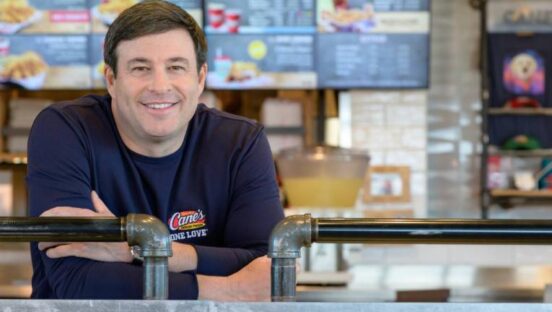Raising Cane’s pandemic journey:
2019 (a pre-COVID look)
- U.S. systemwide sales: $1.466 billion
- Average sales per unit: $3.6 million
- Franchised units (year’s end): 86
- Company units: 371
- Total units: 457
- Total change year-over-year: 57
2020:
- U.S. systemwide sales: $1.722 billion
- Average sales per unit: $3.850 million
- Franchised units (year’s end): 92
- Company units: 417
- Total units: 509
- Total change year-over-year: 52
2021:
- U.S. systemwide sales: $2.377 billion
- Average sales per unit: $4.893 million
- Franchised units (year’s end): 23
- Company units: 544
- Total units: 567
- Total change year-over-year: 58
The short version is founder and co-CEO Todd Graves saw his company’s restaurants earn nearly $1.3 million more per location, and add 167 of them over a three-year period.
There’s no grand mystery under the current. When the world stopped, food didn’t. In fact, those quick-serves with a drive-thru welcomed more market share than ever as dine-in left the picture. For Raising Cane’s, sales climbed 20 percent and have remained elevated. The chicken chain had to adapt to this flood. It became faster. It learned to use multi-lane drive-thrus. The brand added fryers to boost throughput and embraced handheld ordering. “All these great things we learned,” Graves says.
As this graph from Revenue Management Solutions shows, drive-thru is the only revenue channel comping negative, year-over-year, of late. However, the straight-line of its curve suggests a broader theme: Unlike some other spikes and plunges, drive-thru has stabilized into a more robust version of its past self. It might not be at peak-COVID marks, but it hasn’t dipped below pre-virus figures, either. It’s even moving up, month-over-month, in more recent looks.

In the National Restaurant Association’s State of the Industry Report, at least four in 10 operators in each of the three limited-service segments believed the addition of drive-thru lanes would become more common in the near-future:
Quick service
- More common in 2023: 40 percent
- Less common: 16 percent
- About the same: 44 percent
Fast casual
- More common in 2023: 40 percent
- Less common: 22 percent
- About the same: 38 percent
Coffee and snack
- More common in 2023: 43 percent
- Less common: 13 percent
- About the same: 45 percent
There simply isn’t a lot to suggest Raising Cane’s is going to cede ground at this juncture or into the future. Of the top 50 highest-grossing quick-serves in America last year, it was second only to Chick-fil-A in AUV. COVID opened the gates and Raising Cane’s got better at every lever driving that expansion.
However, there was something nagging Graves as the brand rode this drive-thru tailwind and kept rising. Those sales gains? “It didn’t feel good,” Graves says, “because we were taking that from the family-run restaurants, right? These small business owners. People weren’t going to them, and they were coming to places like us, with the drive-thru.”
The independent struggle triggered Graves’ 2021 TV series “Restaurant Recovery.” The Discovery+ 10-episode run featured Graves helping mom-and-pop operators get back on their feet, with the help, at times, of some celebrity ringers, like Snoop Dogg and Nelly.
“I’d say things like, ‘look man, these restaurants don’t have the money, they don’t have the ad budgets we do, they don’t have these big buildings on the properties where you see it,’” Graves says. “I wanted people to think about going about to their [local] place and go there, which I do and my family does. I love you coming to Raising Cane’s, but the next time, that week, when you’re thinking of Raising Cane’s, think of that family restaurant.”
It isn’t often restaurants purposely try to feed the competition, but Graves isn’t exactly the “often” executive. He famously traveled to California to work as a boilermaker in an oil refinery before boarding an Alaskan salmon boat in 1995, hoping to raise enough money to open Raising Cane’s, a restaurant named after his yellow lab that nobody else seemed to believe in. The original business plan earned Graves the lowest grade in his college class (the professor didn’t believe chicken fingers would sell in South Louisiana). Banks felt the same.
Now, as Graves reflects 27 years later, he’s seeking ways to turn that story into inspiration. “Don’t let people tell you you can’t do something,” he says.
Graves appeared on other shows, including “Secret Millionaire” where he gave $400,000 to parishes hit by Hurricane Katrina. Eight million people tuned in, Graves says. “I thought, you know what, I want to inspire people through other people’s stories,” he says. “To inspire people to go for their dreams and have a better life.”
That drive, along with the category discrepancy split open by COVID mentioned earlier, is what brought Graves to his latest feature, “Secret Sauce with Todd Graves,” which began airing in early March on A&E (episodes air 1 p.m. eastern on Saturdays).
Graves travels around America meeting “people from all walks of life to learn about their paths to success.” Thus far, it’s included, among others, Kendra Scott and her billion-dollar jewelry business, actor Danny Trejo, Lee Brice, Ashley McBride, Martin Luther King III, and Nelly.
“Everybody’s story comes from hard work, determination, not giving up, going for your dreams, not listening to the naysayers that you can’t do this,” Graves says.
Musician Swae Lee, for instance, had to work at Olive Garden to make $500 to go to Atlanta and sleep on a friend’s couch. Nelly loaded McDonald’s trucks so he could get into the studio. “It’s really interesting how both of those shows [Restaurant Recovery being the other] came about because of the onset of COVID, and us doing well but not feeling great about it. Because it meant that other people were not doing well,” Graves says.
The experience also made Graves think about what’s next. He, like many pundits, believes more chains and franchises are coming at this turn in the recovery. Corporate arms have more capital and means to get units open, and the resources to navigate the pressures of running them, like inflation and delayed timelines. Also, a less tangible yet valid point—loans have become easier to secure for franchisees looking to scale established and well-leveraged companies that proved their mettle during COVID. The probability for success is clearer for investors to bet on.
As you might imagine, this is another double-edged reality in Graves’ opinion. On one hand, he’s going to keep pushing Raising Cane’s higher. On the other, “I love hole-in-the-wall restaurants,” he says.
“I think you get different thoughts, different creativity, different food, different owners,” Graves says. “… It makes the landscape way less interesting and we’re losing a lot of our cultural hubs. On the opposite side, I am happy for people who are able to open their own business who couldn’t before. They couldn’t get the financing for an independent restaurant but they could for franchising.”
If anything, though, it’s a chance for chains to step up, he believes. “We’re involved with everything from junior achievement from local chambers to small business administrations,” Graves says, “to all these organizations that are helping those independents get started.”
Again, while it might feel business-backward, Graves says Raising Cane’s community-cognizant approach is one of the reasons the brand resonates as it scales. It’s a chain with a heartbeat. And customers own it like they would a local spot. They see the brand involved in their day-to-day and it unchains Raising Cane’s, to a degree.
[image source_ID=”129563″]
That’s something that’s matured from within over the years, Graves says. In January, the brand flew 10 general managers to its Dallas office under the premises of an in-person “feedback session” ahead of its all-company meeting. There, co-CEO and COO AJ Kumaran brought the group on stage and gave them all-expense paid trips to Hawaii. The previous summer, Graves bought 50,000 lottery tickets in hopes of hitting the Mega Millions jackpot, which had reached $790 million at that time. If he had won, Graves says, he would have distributed the winnings to employees.
Overall, across the last two or so years, Raising Cane’s added more than $200 million in wage increases and introduced a Restaurant Partner Program intended to turn GMs into millionaires. The latter began at the start of 2020 and is designed to give employees more than $1 million in net worth within 10 years. To qualify, they must be a GM for at least a year and show strong results. Once selected, they go through a 12-month probationary period before graduating into the official program. As of last August, there were 150 Restaurant Partners, including 40 that joined that year. By fall 2022, Raising Cane’s had created 4,500 jobs and promoted over 1,200 employees. More than 40 percent of corporate leaders began as workers inside a restaurant.
For broader perspective, Raising Cane’s has an entire department dedicated to showing appreciation to crewmembers called “Cane’s Love.” Leadership writes roughly 4,000 thank you cards per week to employees. During its final systemwide call of 2021, the chain gave away more than $100,000, including dozens of workers receiving $1,000 bonuses, five earning $2,500 for tuition costs, and two getting $5,000 to help pay bills.
When COVID first arrived, the company refused to furlough or lay off any of its 23,000 workers. A couple of months later, Raising Cane’s doubled down on its “No Crew Left Behind” mentality by distributing $2 million in bonuses to account for hours some employees gave up so everyone could remain employed. Neither Kumaran nor Graves took a salary at the time.
Then, in August, the fast casual bolstered retention efforts by expanding its educational benefits, comprising of access to college-level courses, reimbursed class costs to complete a high school diploma, and up to $5,250 per year in tuition reimbursement.
Raising Cane’s was one of only three restaurant brands names to Forbes’ “Best Employers for New Grads” and one of only four hospitality companies to be on Glassdoor’s “100 Best Places to Work in the U.S.” It was also a QSR Best Brand to Work For.
Graves says, dressed down, he’s trying to pay it forward. He knows how impossible his story was and wants to reward fate. But it’s also true Raising Cane’s efforts on this front circulate. Operators in a year-end survey told the National Restaurant Association first-time employees filled 22 percent of openings in 2022. It was even higher—27 percent—in quick service. Fourteen percent of job openings in 2022 were filled by people promoted internally. Four in 10 quick-service positions were taken by either new entrants to the workforce or people being promoted from other positions within the same restaurant.
These employees are the community Graves speaks of. How they’re treated by Raising Cane’s fuels a peer-to-peer conversation that reflects well on the brand and empowers other businesses.
Graves was named a Top CEO by Glassdoor in 2019. He received an approval rating of 95 percent by his employees, placing No. 28 on the list. Among the roughly 900,000 companies reviewed on Glassdoor, the average CEO figure was 69 percent. “That’s crazy stuff when you think your crew members vote for you. They rate you that,” Graves says. “But it’s like, that’s what I’m supposed to be doing.”
“Our business, quick service, we’re most people’s first job in the country,” he adds. “And so, we have a responsibility to teach them good work ethic, but to have fun and learn how to treat people right. How do you serve people? How do you earn people’s money? When you have a good example of that and with a founder being around, that’s a lot of influence, man, and it’s a purpose.”
Why aren’t more brands following Raising Cane’s path? Graves wishes there were more founder-driven businesses in the industry, as there were decades ago. As good as private equity has been for many brands, it often disrupts the decision-making checklist, he says.
“I have to answer to my crew and my customers, but I don’t have to answer to a board, I don’t have to answer to shareholders,” Graves says. “It’s very easy for us to make decisions, go to Hawaii and get big bonuses this year, because I can make those decisions independently.”
“Also,” he continues, “this is my baby. Our culture is built on appreciation. Appreciation for our crew, our customers, and our communities because I’m still that guy. I’m still that kid that’s working in Alaska to try to go for his dreams. You just never lose that appreciation when it’s so hard to start. So I put my people and my crew first. And I put my customers right behind them. I put my communities right behind them.”
“Secret Sauce” began filming in the summer of 2020. All of it took place during the thick of COVID. As Graves was getting episodes together, he was often running back to the trailer to take calls for Raising Cane’s. “Back and forth like crazy,” he says.
The response has been great to date, Graves adds. And there are still a couple of episodes to go. He isn’t sure if he’ll keep adding to his TV credits or what his next premiere might look like. But Graves wants to be out there, sharing his story.
“Honestly, I think God made me good at chicken fingers to help people,” he says.









